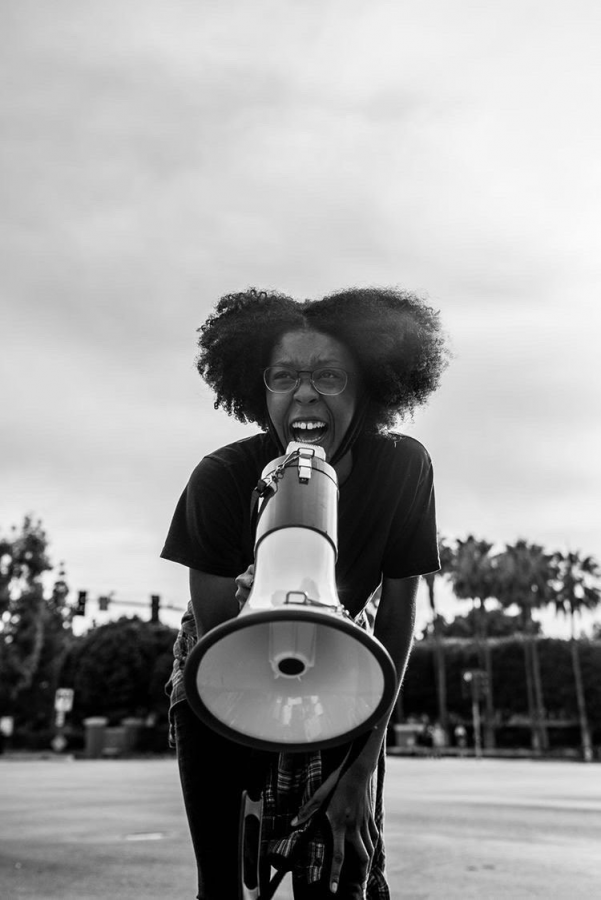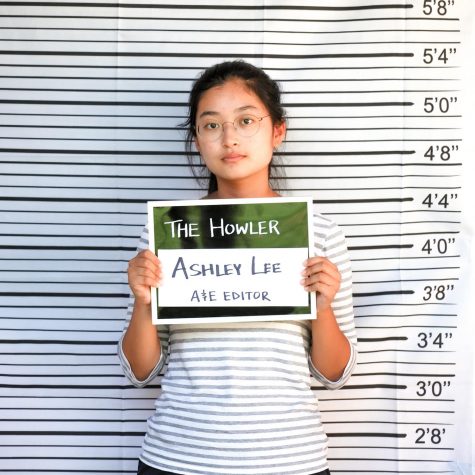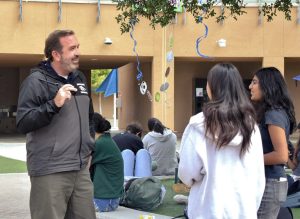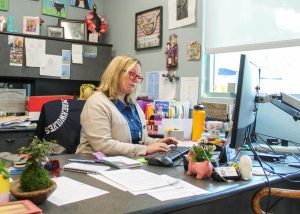Tori Oriola on Black Lives Matter: “Your voice matters”
LET ME TALK: Northwood graduate Tori Oriola uses a megaphone to amplify her voice, as she spreads awareness about the Black Lives Matter movement in one of the rallies she attended.
June 11, 2020
The voice of Tori Oriola, Northwood’s Class of 2020 graduate, resonated with the audience during a rally at the Irvine Civic Center on June 6. Oriola shared her message about the Black Lives Matter (BLM) movement and led the audience in chanting “Let me talk.” Afterwards, she shared her views on justice and changing the world in a virtual interview with The Howler.
The Howler: What does the BLM movement mean to you?
Tori Oriola: It means the world to me. I’ve never felt so supported by so many people that I don’t even know. I don’t feel like I need to be silent anymore. This movement has given me a platform to speak my mind and tell people my story because I feel like it needs to be heard.
TH: What change do you think needs to happen in the future?
TO: The main change that needs to happen is that rules need to apply to everyone. And when I say that, I want to hold every single person accountable for whatever crime they did. What also needs to change is the divides that we have put in our own community. We need to change our neighborhood and care for our neighbors. We need to change the relationship we have with other cultures and accept their culture. There needs to be a unification of all people and we need to have empathy for others. We need to help people who are normally the underdogs.
TH: How do you think people achieve change?
TO: The main thing I can tell you is to not remain silent and speak up because your voice matters, your opinion matters. But you also have to be open to other people’s opinions and be respectful about it. Other things you can do is to educate yourself about black history and try to understand why people are protesting, how angry they can be because of the long-lasting history behind this movement. Another thing you can do is take action. You can do that by donating to bill funds and charities that support this movement and support black-owned businesses if you got money like that. But as a high school student, I’ve seen a lot of people my age write letters to public officials and politicians to demand justice for everybody that has been assaulted or killed by the police. Speak your mind, please. We really need it.
TH: What do you think is the “status quo” in the United States right now in terms of the BLM movement?
TO: Right now, it is a lot of people our age and a lot of multicultural people speaking up, which is something I have never seen before. Our generation tends to be a lot more accepting and inclusive to other people’s emotions than any other generation that I’ve seen. There are a lot of educated people who can make a difference, and I think that is going to change the dynamic of our society. There was this really big debate about why people shouldn’t…or [should] say “All Lives Matter” and my response to that is “All Lives Matter” is a false statement, a really big misconception. All lives won’t matter until black lives matter. There is no justice for all until there is justice for black people.
TH: What does justice mean to you? And what does equality mean?
TO: I think justice truly is looking at people for people. I want my life to weigh the same as someone who doesn’t look like me. I want laws to be changed [to reflect that]. I think there’s too much leeway for arbitrary decisions to be made through sentencing and convicting. I want reformation across the board of every system. I want change in the educational system, change in the judicial system and the legislative system. I want it to be equal for every single person, no matter their race or their ethnicity.
TH: There’s been a lot of debate between peaceful vs. violent protests. What are your views on this debate?
TO: I do understand that there’s a built-up of rage for people of color, but I don’t think the looting and the breaking of property are really for the cause of what I stand for. Those are different people. Those are people who are angry, not people who support the movement of Black Lives Matter. Because the movement is really about unity and justice for all.
TH: How has this movement and recent events impacted your identity?
TO: I have felt so strong throughout this entire movement. If you met me in high school, you would see me as quiet, non-confrontational and not-so-defiant in my opinions, but that has really changed throughout this movement. I am confident and I know I am smart: That is something I haven’t felt in my own community. It’s made me a lot more passionate about my own culture and so much more prideful about the color of my skin because through all my years of living, being black was not something to be proud of. It was always a setback, it was always something to complain about and it was always about something that I would have to change for other people. I would straighten my hair to assimilate to my own friends, to feel accepted, but that is no longer the case. And I don’t ever want that to happen to a black individual or somebody who is a person of color. Your color is your beauty and your voice matters. Your life matters. And I will always fight for your life, I will always fight for anybody who’s being discriminated against. And I want everybody to join me. Where will you stand at this point in history?



![AAAAAND ANOTHER THING: [CENSORED] [REDACTED] [BABY SCREAMING] [SIRENS] [SILENCE].](https://thehowleronline.org/wp-content/uploads/2025/06/lucy-1200x800.jpg)






















































Brooke Leys-Campeau
Jun 11, 2020 at 1:28 pm
Keep setting the world on with your voice Tori! We’re listening